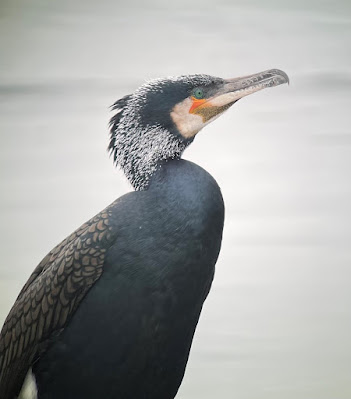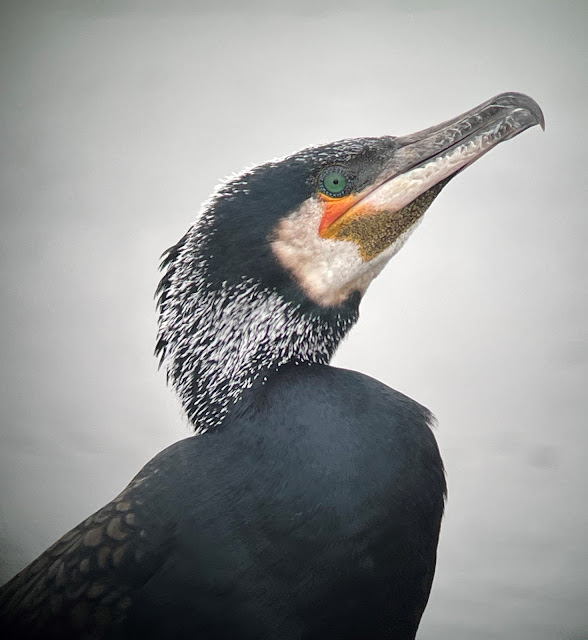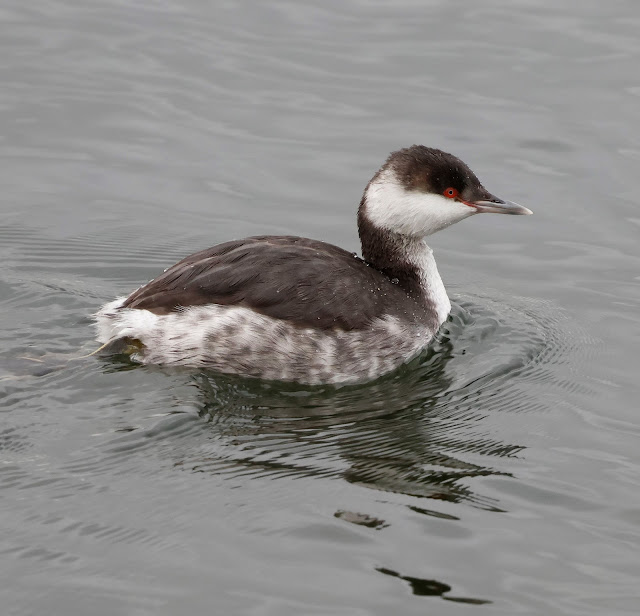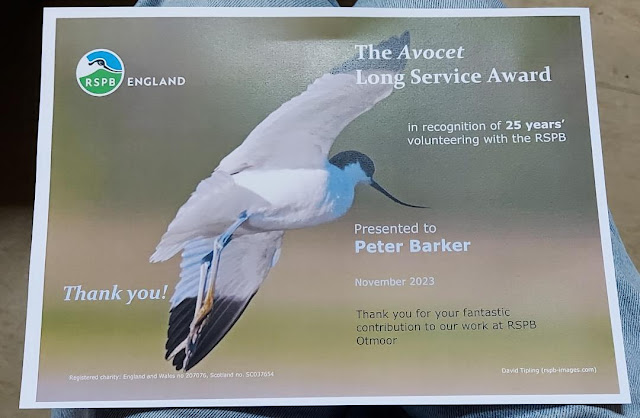Highlights
After a relatively quiet October, November actually
turned out to be a busy month with a scattering of rarities throughout the
month to keep county birders entertained during this usually very lean period
for Oxon birding. Unfortunately for those unable to be reactive enough most of
the rarer birds only remained present for the day or even for single afternoon.
Given the abundance of rarities spread fairly evenly throughout the month it is
somewhat surprising that the highlight of the month is not a rarity at all.
Instead, a fairly common species observed during both migration periods at
waterbodies and flooded fields spread across the county was present in
unprecedented numbers in a somewhat unassuming and unexpected place.
With the quiet October and the deluge of wet weather
a flooded field in Cote near Bampton become the centre of the
Oxon birding universe with an ever present wader population ebbing and flowing
with the rising and falling waters of the floodplain. With 13 species of wader recorded
here between the middle of October and late November, the first
sign something maybe a foot came on the 3rd of November when
an unseasonable flock of 16 Dunlin were present. This flock would grow
and shrink depending on daily conditions on site and appearing to peak at 91 on
the 14th, a count that broke the previous county record going all
the way back to 1986 at Port Meadow with 89 here back then. Several
days later though, an extraordinary count of 258 was recorded completely
smashing the county record and a significant inland record anywhere in the UK. The
following day however, things got even more bonkers when the next observer
counted more than double the previous count at a whopping 586! This just goes
to show the importance and value of temporary habitat such as this and the how
easily records such as these can go undetected on underwatched land.
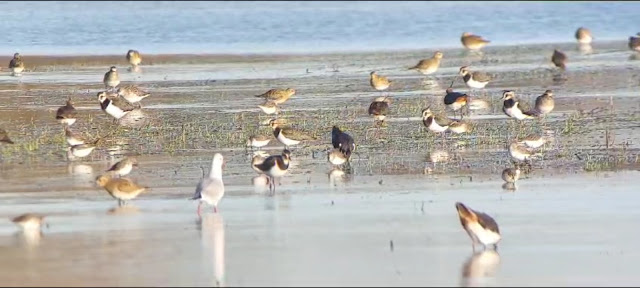 |
| Just some of the wader action at Cote, courtesy of Mick Cunningham |
The county year list continues to tick away nicely with an
extra five species added in November taken us to 210 for the year, which is bang
on average for the last two decades and with December yet to come there’s
a possibility to add at least one or two more before 2024.
at Farmoor on the morning of the 10th November. Luckily news of
its provenance was forthcoming and it was ringed as a chick in northern Germany
along the Baltic Coast back in 2020 at Wallnau Waterbird Reserve,
Fehmarn. It has been observed twice since then, both times at Farmoor – the
first time on the 27thAugust 2022 also at Farmoor.
Aside from the excitement over at
Cote with the mega Dunlin flock, there was plenty of records of
waders this month with a good variety of species and numbers present – albeit
with many of them coming from Cote-upon-Humber. A pair of Turnstone got
the month going with both present on Farmoor on the 1st of
the month. Grey Plover appeared to range between a couple sites with the
first record coming from Port Meadow on the 17th, with presumably
this individual not enjoying the frequent disturbance and human presence and
popping up at Cote on the 23rd. This was then joined by a 2nd
on the 24th with both remaining here until at least the 28th
in the company of several thousand Golden Plover and Lapwing. Also
putting in a brief appearance late in the month at this site was a Ruff present
in the masses of waders feeding on the floodwaters.
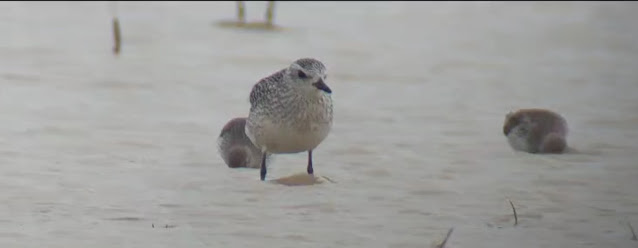 |
| Grey Plover at Cote, courtesy of Mick Cunningham |
Black-tailed Godwit were
seen at several sites in November although only singles were present. Days
Lock hosted one on the 3rd, whilst Cote had one from the
9th until at least the 10th. Port Meadow also then
hosted a lone bird for a couple of days from the 27th. Cote continued
to be the wader magnet with Ringed Plover present in various numbers throughout
the month, kicking off with a flock of 6 on the 3rd. Singles and doubles
were present again later in the month where then 6 again were present on the 25th.
Dunlin were obviously present in huge numbers as previously mentioned in
the highlights with a reduced count of 200+ still present up until the end of
the review period. Other sites also hosted birds this month albeit in much more
typical numbers for the county. Farmoor hosted a single bird on the 1st
and again on the 3rd and 17th, whilst East Hanney hosted
12-13 birds from the 5th and occasionally through until the 26th.
Port Meadow hosted birds later in the month, presumably birds peeling
off from Cote. Eleven were here on the 21st and number ranged
from 3-12 until the end of the year.
Green Sandpiper continued
to be recorded in much reduced numbers this month, presumably with birds
establishing possible winter territories. Curbridge had one bird on the
11th, whilst Bicester Wetlands had three birds also on the 11th.
Ardley ERF also hosted multiple birds with two present here on the 25th.
Redshank, like much of the waders recorded through the month, were almost
ever present at Cote this month. A maximum count of 7 here on the 11th
with multiple birds present most of the month. Fyfield Wick saw a single
flyover bird on the 11th whilst Farmoor hosted three birds on
the 13th and a single on the 19th. A single bird was also present on the floods at Cholsey.
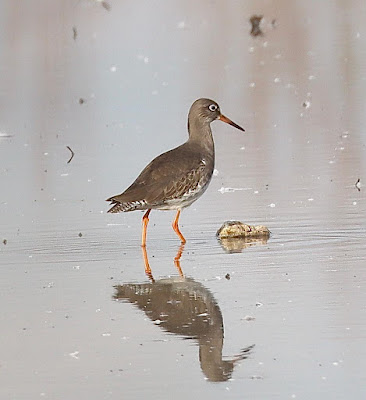 |
| Redshank courtesy of Alan Dawson. |
Woodcock made a decent
return to the county in the latter part of November with the first of
the month coming from Lye Valley on the 18th. Port Meadow also
hosted a single bird on the 21st whilst continuing the urban theme a
dead bird was picked up at the Dragon School in Oxford on the 24th.
Last winters well used flight line over Piddington was watched for the
first time this winter and produced three birds heading out of roost and heading
to feeding grounds in the wider landscape.
Wildfowl etc
Easily the standout rarity in
this group this month was a ‘short-stopping’ pair of Bewick Swan at Otmoor
on the 25th. The first record since 2018 with what was an annual
species for the county previously and one of the depressing elements of an ever
warming climate. With birds now looking to winter in parts of Europe en
masse, whilst birds that do arrive here arrive later and depart earlier
this is increasingly a standout county rarity and there could very well be a
time where these amazing swans no longer return to the UK. One of the
more amazing aspects of Bewick Swan is the ability to tell individuals
apart by the pattern of their bills, with each being distinct and unique to
individuals. Luckily, even though these birds remained distant one was at least
identifiable as ‘Bruton’ and she was seen the following day at WWT Slimbridge.
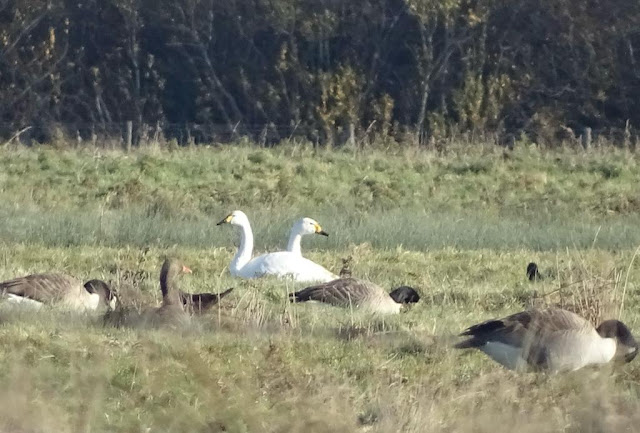 |
| The two Bewick’s Swans at Otmoor, courtesy of Jackie Newcombe |
Grebe present on Farmoor on the 18th. The first record
since the long-staying bird from late 2019 that remained until early 2020. Unfortunately,
unlike that bird, this was to be only a short staying individual who disappeared
over night with no sign at all the next day.
somewhat overshadowed by the above, but who doesn’t love a Smew? Surely the
best of all our winter wildfowl in any plumage! This bird was even more special
by the fact that it was the first Smew recorded within Oxford for
75 years, another amazing urban record of such an enigmatic species. Unfortunately,
another short stayer with the bird disappearing not long after the initial sighting.
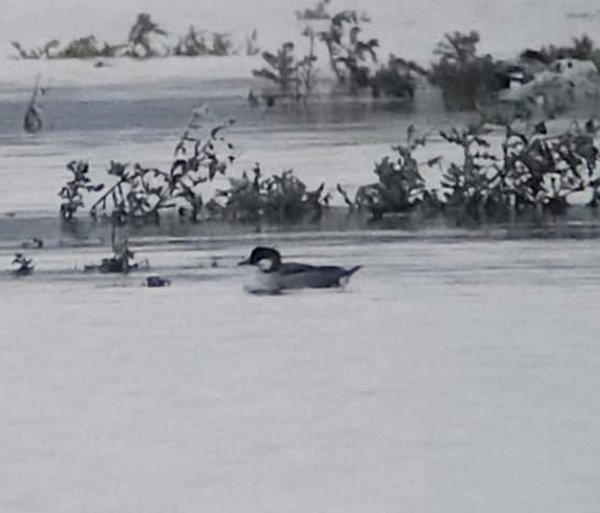 |
| The red-head Smew on Port Meadow, courtesy of Steve Lavington |
Given the abundance of inland records surrounding the county during the latter
part of October it is no surprise that Oxfordshire finally got in
on the diver action in early November. The biggest surprise was the
location, with a Great Northern Diver present on Thrupp Lake at Radley
GP’s on the 1st. Given the levels of disturbance and the size of
the site it is somewhat less surprising that the bird didn’t seemingly hang around
any more than an hour or so before departing somewhere much more suitable.
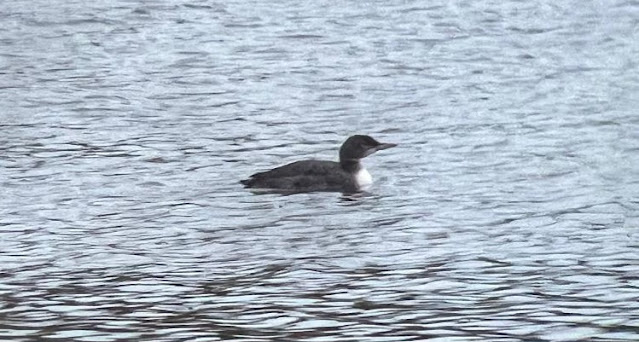 |
| The Radley Great Northern Diver, courtesy of Ben Carpenter |
The years first Brent Goose was
also logged this month when a single bird dropped into Farmoor on the afternoon
of the 7th. Unfortunately, like many of this months rarities it did
not linger long and was gone by sunset. Also at Farmoor the female Scaup
continued its prolonged stay having arrived the previous month, presumably
this individual will now spend much of the winter here with a potential foray
to Dix Pit as other birds have occasionally done in recent years. Shelduck
were fairly widespread across the county with several groups of multiple birds
present. Four were on Port Meadow on the 6th with birds returning
here on the 25th and 27th. Cutteslowe Park hosted
a single on the 12th, whilst Cote continued to be the epicentre
of birding activity with birds here on the 13th and 23rd rising
to 11 individuals by the 25th. Grimsbury then hosted a single bird on
the 28th.
The Farmoor female Scaup courtesy of Gnome
Ruddy Shelduck were
recorded at a single site with Blenheim hosting a pair of birds on the 16th
a nice bonus for the Patchwork Challenge patcher there. Goosander were
at four sites with all birds been reported in the latter part of the month. Chinnor
hosted a pair on the 17th, whilst Port Meadow hosted the
most birds with 7 on the 21st and again on the 27th. Two
other sites hosted multiple birds towards the end of the month – Standlake on
the 24th and Grimsbury on the 26th. Goldeneye also
returned to the county in greater numbers this month with at least 5 sites hosting
birds – Blenheim, Pit 60, Dix Pit, Farmoor and Radley GPs. A few
notable Mandarin records for the county this month with a high count of
20+ at Blenheim present for much of the month, whilst a single bird at Farmoor
on the 21st was notable for its rarity value for the site.
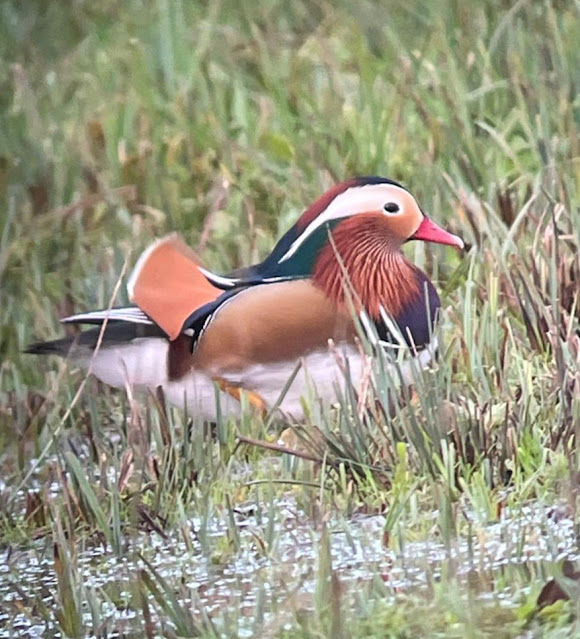 |
| A drake Mandarin at Pinkhill, Farmoor, courtesy of Dave Lowe |
Herons,
egrets etc
Cattle Egret continued to linger in the county through
November, albeit with some visible departures from the main post-breeding
flock peaks of the autumn. Otmoor hosted the most birds with up to 13 on
the 11th with at least four remaining until the 20th. Wytham,
Port Meadow and Days Lock also hosted birds this month with four at Wytham
on the 11th, a single at Port Meadow on the same day and
a small flock of four at Days Lock on the 24th.
Great White Egret were at 7 sites this month made up of
mostly single birds, although the highest count came from Blenheim with
four birds here on the 15th. Records of other multiple birds came
from Farmoor on the 19th and Standlake on the 24th.
Lye Valley recorded only its 5th ever record of the species
on the 20th although this is the 4th record this year. Other
records came from Radley GP’s, Cote, Chipping Norton, Port Meadow and Waterstock.
Surprisingly Crane were still recorded this month when two were at Otmoor
on the 6th, although not again after having possibly made their way
down to the Somerset Levels to winter.
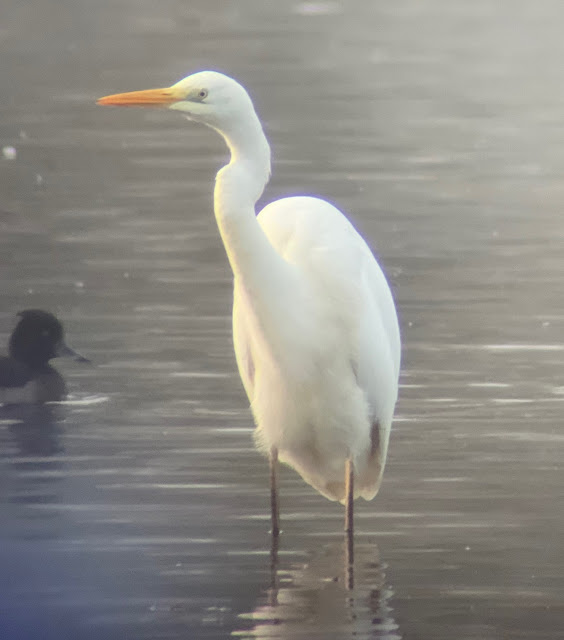 |
| Great White Egret at Radley, courtes of Ben Carpenter |
Gulls
and Terns
With winter well and truly set in the main staple for this
group relies on Caspian Gull to keep records ticking over with the faint
hope of a white-winger in the latter stages of winter the ultimate prize. A few
records of Caspian Gull this month mostly relating to one or two 1st
winter individuals roosting at the same couple of sites. Farmoor hosted
a single 1st winter on the 1st of the month joined by a 2nd
on the 15th. Appleford village hosted a single adult on the
17th, whilst Port Meadow hosted a single 1st
winter on most evenings from the 21st of the month. Grimsbury on
the other hand hosted a probable hybrid bird or one of at least some mixture in
its genes having been observed as less than typical example of the species.
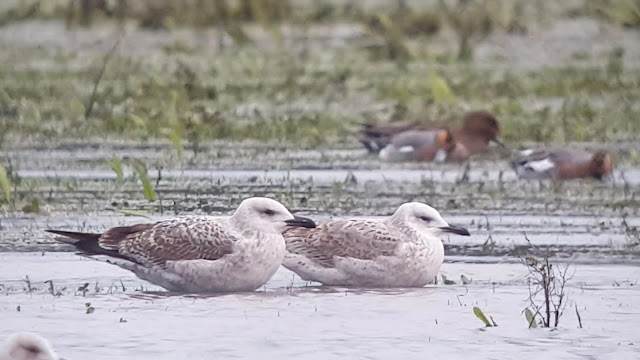 |
| 1w Yellow-legged Gull and Caspian Gull on Port Meadow, courtesy of Thomas Miller |
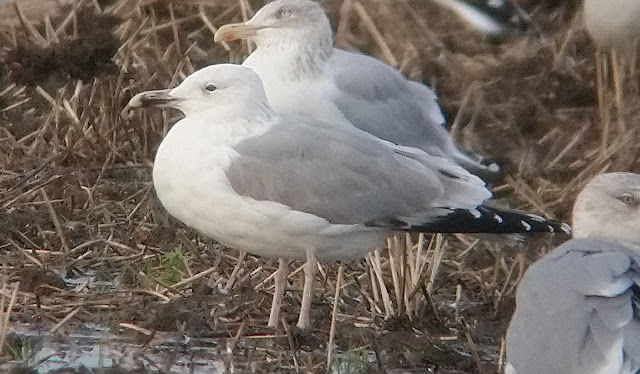 |
| 3w Caspian Gull at Appleford, courtesy of Ian Lewington |
Passerines
With all the talk and subsequent evidence of major influx of
Waxwing into the country we are certainly in the grips of a ‘Waxwing winter’,
with flocks of 1000+ in Scotland and many flocks of 100+ across the
north of the country. Given the abundance it was only a matter of time before
the first record this far south with birds in the midlands and to the east of Oxfordshire.
Unfortunately the record was a fleeting one with lone ‘trilling’ call
heard over classic habitat in an industrial estate in north Banbury. Given
the number of records in the country and still yet to move south in search of
berries hopefully Oxfordshire will get its fair share of twitchable
birds yet!
Also pretty fleeting was a record of Water Pipit on
the 27th from Port Meadow, jotted down as a possible heard
calling over the floodwaters. A record of Rock Pipit on the 6th
was also potentially recorded as either species and could feasibly relate to
the same unidentified individual that will hopefully give itself up at some point.
Hawfinch were recorded twice this month with both coming from calling
birds heard over Blenheim on the 17th and 20th
although neither record was able to be pinned down. Crossbill were
reported from two locations with a flock of 3+ reported from Aston Rowant on
the 11th whilst Blenheim hosted a flock of 11 birds on the 19th.
The first Siberian Chiffchaff of the winter was caught and ringed in Burgess
Field, Port Meadow on the 29th, a fantastic ringing record for
the site and a nice bird to see up close for the ringers.
 |
| Siberian Chiffchaff courtesy of Thomas Miller. |
Firecrest were also reported from two sites – Warburg
on the 3rd and West Hendred on the 24th. Brambling
were spread nicely around the county with mostly singles and pairs in mixed
finch flocks. The highest count however was a fantastic c50 over a Blenheim in
a mixed flock of 300+ finches feeding in sunflower field. Records came from a
further eight sites with the next highest count coming from Fyfield Wick on
the 17th with a small flock of 7 birds over.
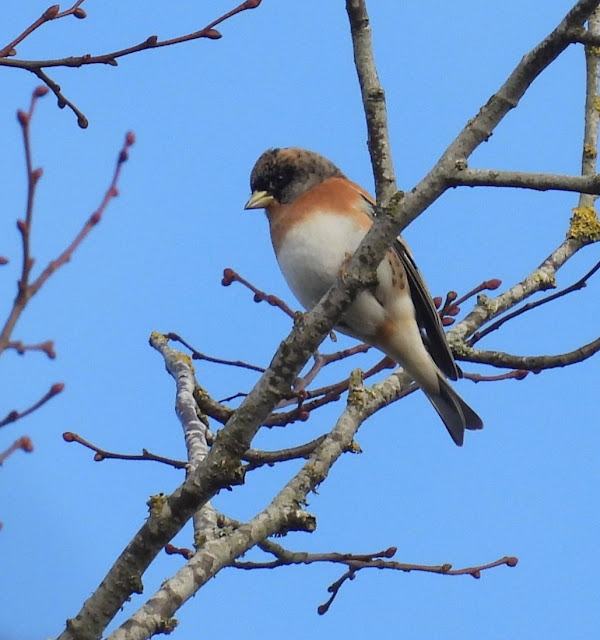 |
| Stonesfield Brambling, courtesy of Paul Wren |
Raptors
A Hen Harrier was present infrequently towards the end of
the month, with the first record coming from a bird taking advantage of the Starling
roost on the 23rd. It was then reported again on the 29th
although details were not forthcoming as to where and what age/sex the bird was.
Short-eared Owl records mostly came from the same location on the downs with
up to four around the Ridgeway and Crowhole Bottom throughout the
month. Additional records came from Oxfordshire Golf Course with two
seen quartering the rough ground through the day.
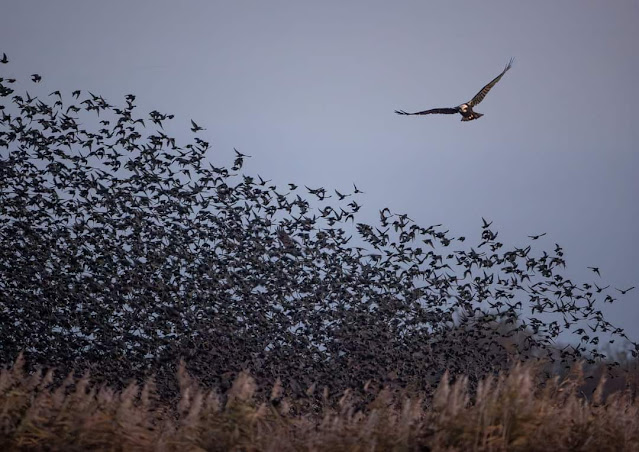 |
| A Marsh Harrier harrying the Starling roost at Otmoor, courtesy of Malcom Bowey |
Merlin were reported from four sites this month with Cote
the most frequently used with a bird present on the 4th and 10th.
Water Eaton hosted a bird on the 11th, whilst another was at Farmoor
on the 14th. West Hagbourne also hosted a single bird on
the 26th.
Patchwork challenge
|
Patch |
Birder |
Points |
Species |
Highlight |
Target |
Percentage of target |
|
Aston eyot |
Ben Sheldon |
58 |
56 |
|
90 |
64.44 |
|
Blenheim |
Gareth |
131 |
115 |
|
100 |
131.00 |
|
Dix pit |
Simon |
114 |
91 |
|
75 |
152.00 |
|
Grimsbury reservoir |
Gareth |
126 |
111 |
|
130 |
96.92 |
|
Lye valley |
Tom Bedford |
98 |
87 |
|
80 |
122.50 |
|
River Thames |
Geoff Wyatt |
159 |
135 |
|
122 |
130.33 |
|
Sutton courtenay |
Conor |
156 |
130 |
|
140 |
111.43 |
|
East challow |
Mark Merritt |
84 |
80 |
|
83 |
101.20 |
|
Freeland |
Glen Pascoe |
90 |
80 |
|
80 |
112.50 |

